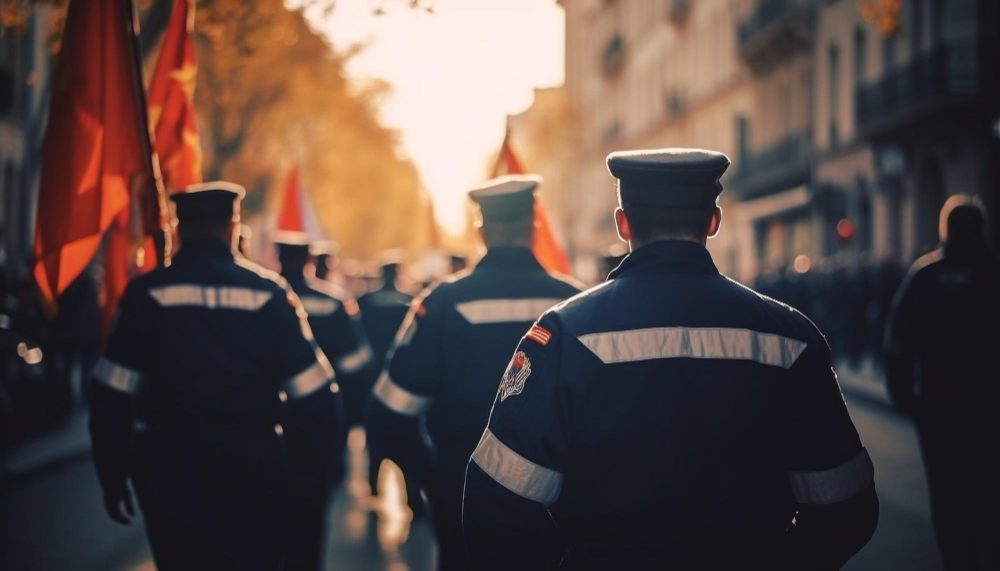Unraveling the Language of Law Enforcement: Exploring Cops in Slang NYT
Welcome, fellow word enthusiasts and puzzle aficionados! Today, we embark on an exciting linguistic journey that delves into the unique world of law enforcement. Have you ever come across a crossword clue that left you scratching your head? Perhaps one such enigma piqued your curiosity—a tantalizing hint begging to be deciphered: Cops in Slang NYT crossword clue. Fear not! We are here to unravel this perplexing phrase and dive deeper into the fascinating language spoken by those who protect and serve our communities.
But wait, there’s more! Join us as we explore not only the secrets behind this cryptic clue but also uncover the hidden benefits of solving crossword puzzles themselves. From improving cognitive skills to increasing vocabulary prowess, these brain-teasers offer endless hours of entertainment while sharpening our minds.
So buckle up, dear reader! Get ready to crack codes alongside some brilliant detectives and navigate through the intricate web of police lingo. It’s time to immerse ourselves in a captivating world where every term carries significance—where words have power beyond their literal meaning. Let’s unlock the doors together and discover what lies beneath the surface with Cops in Slang NYT crossword clue as our guide!
Note: While we aim to provide insights into both law enforcement terminology and strategies for tackling challenging clues throughout this article,
brace yourself for an engaging ride filled with surprises around every corner—no sirens necessary! So without further ado… let’s hit play on this thrilling adventure!
Cops, in Slang NYT Crossword Clue
Law enforcement has always had its own distinctive linguistic style, a secret language shared among officers like an exclusive club. The origins of police slang can be traced back to the early days of law enforcement when officers needed a way to communicate discreetly while on duty. These coded phrases quickly evolved into a rich tapestry of words and expressions that form the backbone of police culture.
From “10-4” meaning affirmative to “perp” for perpetrator, these catchy slang terms have become ingrained in our popular culture thanks to their frequent appearances in movies, TV shows, and yes… crossword puzzles! Over time, new phrases emerge as technology advances or societal changes shape policing practices. This constant evolution keeps the language fresh and ever-evolving.
Common Slang Terms Used by Law Enforcement
When it comes to deciphering Cops in Slang NYT crossword clue, it helps to familiarize yourself with some common police jargon. Cops in Slang NYT For instance, one such term is “coppers,” often used as a colloquialism for police officers themselves. Then there’s “fuzz,” which refers specifically to detectives or investigators.
Other notable examples include “beat cop” (an officer assigned to patrol a specific area), “brass” (referring collectively to high-ranking officials), and everyone’s favorite – “the fuzz.” Each term offers insights into the inner workings of law enforcement while adding an air of mystery and intrigue when encountered within crossword puzzles!
The Significance of Slang in Police Culture
Slang isn’t just about clever wordplay; it also serves a vital purpose within law enforcement culture itself. It fosters camaraderie among officers by creating a sense of belonging—a shared identity that distinguishes them from civilians. Moreover, this colorful lexicon allows for quick communication during fast-paced situations where seconds matter.
Additionally, slang acts as both code and shorthand—allowing officers to convey complex concepts or situations in just a few words. It serves
Crossword Puzzles and Their Benefits
Crossword puzzles have been a beloved pastime for decades, captivating people of all ages and backgrounds. But did you know that these brain-teasing games offer more than just entertainment? They also come with a range of benefits for your mind and cognitive abilities.
Crossword puzzles can improve your vocabulary and language skills. As you search for the right words to fill in the blanks, you’ll encounter new terms and expand your knowledge base. This can enhance your communication skills and make you a better writer or speaker.
Solving crossword puzzles is like giving your brain a workout. It stimulates different areas responsible for memory, Cops in Slang NYT concentration, and problem-solving. Regular puzzle-solving can help keep your mind sharp as you age and potentially reduce the risk of conditions like dementia.
Completing crossword puzzles provides a sense of accomplishment and satisfaction. The feeling of deciphering tricky clues and filling in those final squares is immensely rewarding. It boosts confidence and self-esteem while offering an enjoyable way to pass the time.
So next time you reach for a pen or pencil to tackle that crossword grid, remember that it’s not just about finding words – it’s about reaping the numerous benefits they bring to our mental well-being!
Understanding the Unique Language of Law Enforcement
The world of law enforcement has its own language, a unique blend of slang and jargon that sets it apart from other professions. It’s a secret code that allows officers to communicate quickly and efficiently in high-pressure situations.
From the early days of policing to the present, police slang has evolved and adapted to reflect changes in technology, culture, and society. Terms like “perp” for perpetrator or “APB” for all-points bulletin have become part of our everyday lexicon.
Understanding this language is not just about deciphering crossword clues—it offers insight into the rich culture and camaraderie among law enforcement professionals. It creates a sense of belonging and helps build trust between officers who rely on each other day in and day out.
So next time you hear an officer casually drop a term like “collar” or “10-4,” remember that they are speaking more than just words—they are using their shared language to connect with fellow cops across the country. The unique language of law enforcement is both fascinating and essential for those who protect and serve our communities every single day.
The Origins and Evolution of Police Slang
The language used by law enforcement officers has its roots in a rich history. From the early days of police work to modern times, the slang used by cops has evolved and adapted to reflect the changing nature of their profession.
In the early years, when policing was still in its infancy, officers developed their own unique vocabulary as a way to communicate with one another on the job. This slang helped them quickly convey important information or share insider knowledge without tipping off suspects or civilians.
Over time, this secret language of law enforcement began to expand and incorporate influences from various sources. Officers started adopting terms from other professions like firefighting or military service, creating an amalgamation of jargon that is recognizable today.
As technology advanced and society changed, so too did police slang. Terms related to new developments such as radio communication or forensic science entered into common usage among officers. The evolution of this specialized language continues even now as law enforcement adapts to meet new challenges in our ever-changing world.
Common Slang Terms Used by Law Enforcement
Understanding the unique language of law enforcement is like deciphering a secret code. Within this specialized world, officers have developed their own slang terms to communicate efficiently and discreetly. These words and phrases not only serve as shorthand for police officers but also create a sense of camaraderie within the profession.
One common term you may come across is “perp,” which stands for perpetrator or suspect. This word is often used to refer to someone who has committed a crime or is believed to be involved in criminal activity. Another popular term is “APB,” short for All Points Bulletin, which is an alert issued by law enforcement agencies to notify officers about a wanted individual.
In addition, law enforcement officers use slang terms related to specific situations and scenarios they encounter on duty. For example, “Code 10” refers to a potential fight or physical altercation, while “collar” means making an arrest. These concise expressions allow officers to quickly convey important information without revealing too much over the radio or in public settings.
The Significance of Slang in Police Culture
Slang is more than just a collection of words and phrases. It represents a unique culture, and in the case of law enforcement, it serves as a powerful tool for communication and camaraderie among officers. The significance of slang in police culture cannot be overstated.
Slang creates an insiders-only language that fosters solidarity within the force. When officers use terms like “perp” or “10-4,” they instantly establish a connection with their fellow colleagues, reinforcing the bond that comes with understanding shared experiences.
Slang allows officers to communicate covertly in high-pressure situations. By using coded language specific to their profession, they can relay information without tipping off suspects or compromising operations. This ability to speak freely yet discreetly can mean the difference between success and failure on the job.
Slang helps build trust and rapport between law enforcement and community members. When officers engage in everyday conversations peppered with familiar jargon, it humanizes them and bridges the gap between civilians and those who protect them.
In essence, police slang forms an integral part of law enforcement’s identity – its history, traditions, unity – all wrapped up in words that may seem foreign but hold immense meaning behind them. Understanding this significance helps shed light on why these expressions endure within police culture today
Cracking the Code: Tips for Solving Crossword Puzzles
Crossword puzzles can be both exciting and challenging, especially when you come across tricky clues. But fear not, because I’m here to help you crack the code!
When tackling difficult crossword clues, it’s important to read them carefully and think outside the box. Sometimes clues have hidden meanings or require a bit of lateral thinking. Don’t be afraid to brainstorm different possibilities and consider alternative interpretations.
Improving your crossword puzzle skills takes practice. Make it a habit to solve at least one puzzle every day. This will sharpen your mind and familiarize you with common clue patterns and wordplay techniques used in crosswords.
Don’t hesitate to utilize online resources for assistance when you’re stuck on a clue. There are numerous websites and apps available that provide hints or even complete answers for specific puzzles. Just remember to use these resources sparingly so as not to spoil the fun of solving the puzzle yourself!
Stay tuned as we delve deeper into the fascinating world of crosswords intersecting with law enforcement!
How to Tackle Challenging Crossword Clues
When it comes to tackling challenging crossword clues, there’s no one-size-fits-all approach. Each clue presents its own unique set of hurdles and requires a different strategy to crack the code. But fear not, fellow word enthusiasts! Here are some tips to help you navigate those tricky clues:
Take a step back and assess the clue as a whole. Look for any hints or indicators that could point you in the right direction. Is it an anagram? Does it require some lateral thinking? Understanding what type of clue you’re dealing with is half the battle.
Next, don’t be afraid to think outside the box (or grid!). Sometimes, solving a difficult crossword clue requires creative thinking or making unexpected connections between words. Consider alternative meanings or synonyms that might fit the bill.
If all else fails, seek assistance from online resources dedicated to crossword puzzles. There are countless websites and apps available that provide helpful tools like anagrams solvers or synonym finders. Just remember not to rely on them too heavily; solving crosswords is all about exercising your own mental muscles!
So next time you find yourself stumped by a particularly challenging crossword clue, remember these tips and give yourself permission to think creatively – because sometimes cracking those tough clues can be just as satisfying as completing the puzzle itself!
Strategies for Improving Crossword Puzzle Skills
1. Start with the Easy Ones: When tackling a crossword puzzle, it’s best to start with the easier clues first. This allows you to gain momentum and build confidence as you solve them quickly. Plus, solving simpler clues helps to fill in letter combinations that may help crack more challenging ones later on.
2. Use Wordplay Techniques: Many crossword puzzles include wordplay elements such as anagrams or puns. Learning how to recognize these techniques can give you valuable insights into solving tricky clues. Look for hidden meanings, double entendres, or clever word associations that might lead you down the right path.
3. Expand Your Vocabulary: Building a strong vocabulary is key to becoming a proficient crossword solver. Take time regularly to read and learn new words from various sources like books, articles, and even dictionaries. The more words you know, the better equipped you’ll be at deciphering those elusive clue-word combinations.
Remember, improving your crossword puzzle skills takes practice and patience! So keep honing your strategies while enjoying this brain-teasing game of words!
Utilizing Online Resources for Crossword Puzzle Assistance
When it comes to solving crossword puzzles, sometimes we all need a little extra help. Luckily, the internet is a treasure trove of resources that can assist you in cracking those challenging clues. From online crossword puzzle solvers to forums and communities dedicated to deciphering even the trickiest riddles, there are countless options at your fingertips.
One way to utilize online resources is by using crossword puzzle solver tools. These handy websites allow you to input the letters you have and provide potential word suggestions based on those letters. They can be a lifesaver when you’re stuck on an elusive clue or simply want to confirm your answer.
Additionally, joining crossword puzzle forums or communities can offer valuable insights and tips from other enthusiasts. These platforms create spaces for collaboration and discussion, allowing members to share their knowledge and expertise. Whether it’s unraveling cryptic clues or tackling themed crosswords related to law enforcement, these communities can provide support and guidance throughout your puzzling journey.
Remember, while online resources are helpful aids in solving crossword puzzles, don’t forget about the satisfaction that comes from figuring out answers on your own! Utilize these tools as stepping stones towards honing your skills but challenge yourself by relying on your own intellect too. Happy puzzling!
Exploring the Intersection of Crosswords and Law Enforcement
Crossword puzzles have a way of weaving themselves into various aspects of our lives, even intersecting with seemingly unrelated fields like law enforcement. It may come as a surprise, but there are crossword clues and terminology that specifically relate to the world of cops and crime-solving.
For those who love both crosswords and police dramas, this unique intersection can make for an exciting challenge! Imagine deciphering clues that require knowledge of detective jargon or famous fictional detectives. It adds an extra layer of intrigue to the puzzle-solving experience.
Whether you’re a crossword enthusiast looking to expand your vocabulary or simply intrigued by the language used in law enforcement, exploring this fascinating overlap will surely keep you entertained. So grab your pen (or open up your favorite crossword app) and get ready to unravel the mysteries hidden within these word games!
Crossword Clues and Terminology Related to Law Enforcement
When it comes to crossword puzzles, you never know what kind of clues you might encounter. And if you’re a fan of crime dramas or have an interest in law enforcement, you’ll be pleased to discover that there are often clues related to cops and police work. These clues can range from specific terms used by officers to references to famous TV shows or movies featuring police characters.
One common type of clue related to law enforcement is the use of slang terms. For example, “cops” may be clued as “boys in blue,” “the fuzz,” or even “the heat.” Other terms like “perp” for perpetrator or “beat” for a police officer’s assigned area may also appear. Understanding these slang terms can give you an edge when solving crossword puzzles with law enforcement themes.
In addition to slang, crossword puzzles may include terminology specific to different branches of law enforcement such as the FBI, CIA, SWAT teams, or detectives. Knowing some basic terminology like “badge number,” “interrogation,” or even specific ranks within a police force can help decipher these types of clues. So next time you come across a puzzle with a criminal justice twist, keep your detective hat on and try cracking those tricky law enforcement-related clues!
Notable Crossword Puzzles with Police or CSI Themes
Crossword puzzles have a way of incorporating various themes into their clues and answers, adding an extra layer of excitement for enthusiasts. When it comes to law enforcement, there are several notable crossword puzzles that feature police or CSI themes. These puzzles not only test your general knowledge but also challenge your understanding of the unique language used by law enforcement professionals.
One example is a crossword puzzle that may clue you in on terms like “beat cop,” “forensics,” or “perp.” These words are commonly used in the world of law enforcement and can provide valuable insight into how police officers operate cops in Slang NYT. By solving these themed crossword puzzles, you can immerse yourself in the language and culture surrounding policing.
Another interesting puzzle might involve famous detective characters from literature or television shows like Sherlock Holmes or Inspector Morse. These fictional detectives often have their own distinct slang and techniques, which can be both entertaining and educational for puzzle solvers with an interest in crime-solving.
Some crossword creators incorporate real-life cases or historical events related to law enforcement. This adds another layer of complexity as solvers need to dig deep into their knowledge of crime history to crack the code behind these clues.
Tackling crosswords with police or CSI themes is not only intellectually stimulating but also offers a glimpse into the fascinating world of law enforcement. So next time you pick up a newspaper or open an online puzzle app, keep an eye out for those intriguing themed crosswords that will put your detective skills to the ultimate test!
Unanswered Questions and FAQs about “Cops, in Slang” NYT Crossword Clue
As we delve into the intriguing world of police slang and its intersection with crossword puzzles, you may still have a few lingering questions. Let’s address some of the common queries that may arise regarding the Cops in Slang NYT crossword clue.
1. What does the clue “Cops, in Slang” actually mean?
The phrase Cops in Slang NYT refers to informal terms or expressions used to describe law enforcement officers. In this context, it is a hint for finding words or phrases that represent police officers within the puzzle.
2. How can I improve my skills at solving crossword puzzles?
Enhancing your crossword-solving abilities takes practice and patience. Try tackling puzzles regularly to build your vocabulary and develop problem-solving strategies specific to crosswords. As you become more familiar with different clues and patterns, your proficiency will increase over time.
3. Are there online resources available for assistance while solving crosswords?
Yes! You can find various websites and mobile apps dedicated to helping you solve crosswords. These resources provide tools such as word search functions, anagrams solvers, and even communities where enthusiasts can discuss clues together.
4. Can you provide examples of other noteworthy crossword puzzles related to law enforcement themes?
Absolutely! Some renowned crossword puzzles featuring police or CSI themes include “Crime Scene Investigation,” “Police Procedural,” or even specific references like detective names such as Holmes or Poirot.
5. Is understanding police slang essential for solving all types of crossword puzzles?
While it certainly helps when encountering clues related to law enforcement personnel specifically, having knowledge of various fields is beneficial for completing any type of crossword puzzle successfully.
Remember that each new puzzle presents an opportunity not only for entertainment but also for expanding your knowledge base across diverse topics!







